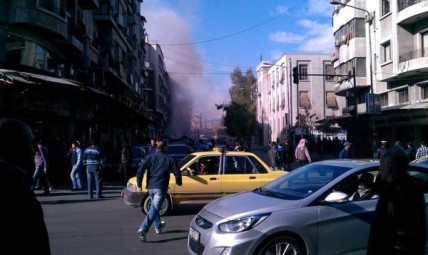
Smoke in old Damascus following double car bomb explosion behind the Justice Palace. Photograph courtesy of NMSyria
Running into Moaz al Khatib on the plane ride to Morocco was kind of a sign, that this would be an interesting reporting trip. And yes, since I touched down in Marrakech it’s been packed with insight on what could happen next in Syria – all depending on how fast the opposition takes charge, and how much they get from the U.S. and others in support.
Hours later, President Obama announced the U.S. will formally recognize the Syrian National Coalition as a legitimate representative of the Syrian people, a high-level diplomatic decision meant to boost the rivals of Bashar al Assad.
But what really matters is what comes next: whether we see a windfall of financial support (which would boost the Coalition’s capacity to deliver aid on the ground), or specific language about the opposition’s right to defend itself (which would hint at more international help with weapons and military force).
If neither one comes through – if there’s no big guns and no big money behind the political endorsement – then the endorsement may not change much on the ground.
That’s the view of opposition leaders like Najib Ghadbian and Mustafa Sabbagh, who gave Syria Deeply an impromptu interview over Moroccan mint tea. They said the opposition won’t name a transitional government and wouldn’t move in to set up in Northern Syria until and unless they have the material support to do so. Basically, that it’s time for the U.S. and the West to put money down on the Syrian opposition.
Those Syrian leaders say they’re also up against a hard wall of people’s expectations. Life in Syria has become so bitter, with hunger and cold setting in alongside deadly violence, that patience with politics is running thin. This opposition in exile will be judged on what help they can deliver. If they can’t channel enough aid soon, they’ll lose their chance to rally a support base inside the country.
It’s not just these opposition leaders who are pleading for a handout. Salman Shaikh of the Brookings Doha Center gave us a long briefing (video below) echoing the same theme: there’s only so much recognition can do. The Friends of Syria will need to put more muscle behind this coalition to make it work.
That points to a larger challenge. While the opposition takes shape, 21 months into the conflict, it may already be too late to assert real authority on the ground. As fighting has escalated, power has concentrated around the brigades that have made the most gains in battle. The politicians have catching up to do before they can carry more clout than the commanders leading the fight.
That means it’s a race for Syria: if the opposition doesn’t get the support it needs, it may lose the chance to project influence at all.




